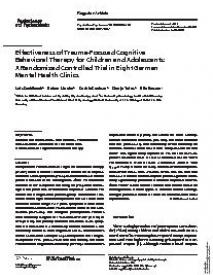Effectiveness of Trauma-Focused Cognitive Behavioral Therapy for Children and Adolescents : A Randomized Controlled Trial in Eight German Mental Health Clinics
Background: Trauma-focused cognitive behavioral therapy (Tf-CBT) is efficacious for children and adolescents with posttraumatic stress symptoms (PTSS). Its effectiveness in clinical practice has still to be investigated.
Aims: To determine whether Tf-CBT is superior to waiting list (WL), and to investigate the predictors of treatment response.
Method: We conducted a single-blind parallel-group randomized controlled trial in eight German outpatient clinics with the main inclusion criteria of age 7-17 years, symptom score ≥35 on the Clinician-Administered PTSD Scale for Children and Adolescents (CAPS-CA), and caregiver participation. Patients were randomly assigned to 12 sessions of Tf-CBT (n = 76) or a WL (n = 83). The primary outcome was the CAPS-CA symptom score assessed at 4 months by blinded evaluators. The secondary measures were diagnostic status, the Children's Global Assessment Scale (CGAS), self-reported and caregiver-reported PTSS (UCLA-PTSD Reaction Index), the Child Posttraumatic Cognitions Inventory (CPTCI), the Children's Depression Inventory (CDI), the Screen for Child Anxiety- Related Emotional Disorders (SCARED), the Child Behavior Checklist (CBCL/4-18), and the Quality of Life Inventory for Children.
Results: Intention-to-treat analyses showed that Tf-CBT was significantly superior to WL on the CAPS-CA (Tf-CBT: baseline = 58.51 ± 17.41; 4 months = 32.16 ± 26.02; WL: baseline = 57.39 ± 16.05; 4 months = 43.29 ± 25.2; F1, 157 = 12.3; p = 0.001; d = 0.50), in terms of secondary measures of the CGAS, UCLA-PTSD-RI, CPTCI, CDI, SCARED, and CBCL/4-18, but not in terms of quality of life. Age and comorbidity significantly predicted treatment response.
Conclusions: Tf-CBT is effective for children and adolescents with heterogeneous trauma types in German service settings. Younger patients with fewer comorbid disorders show most improvement
In: Psychotherapy and psychosomatics, ISSN 0033-3190 | 85 | 3 | april | 159-170
https://doi.org/10.1159/000442824


